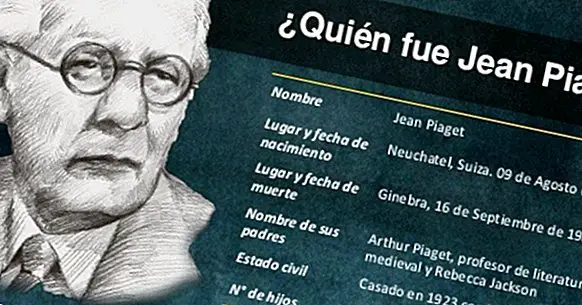What is Constructivism in Psychology?
It is known that psychology is a young science, which has not yet fully matured. One of its aspects in which this becomes more evident is the fact that within psychology there is no unifying theory , that is to say, a theoretical pillar on which all the knowledge extracted from the researchers is based.
On the other hand, there are many schools of thought and approaches and points of departure totally different and, to a large extent, contrary to each other. Constructivism is one of these sets of academic currents, and historically it has been very important , especially in educational psychology. Let's see why.
The constructivist approach
It is very possible that the term "constructivism" may sound familiar to people who have studied philosophy, because it can be used to refer to a philosophical current that emerged in the 20th century and closely related to postmodern thought. From this philosophical constructivism, emphasis is placed on the interpretative component of everything we come to know, instead of emphasizing the importance of aspiring to objectivity and realism.
Thus, there is a moderate constructivism that limits itself to maintaining that reality can not be directly known and that our totally subjective interpretations will be the foundation of what we believe we know, and another radical constructivism according to which reality is, directly, the construction that we make from our interpretations. That is to say, that reality, as we usually understand it, does not exist, because it is not independent of our thoughts and can not be detached from our mental activity.
The difference between moderate and "extremist" constructivism is that the former does not deny the existence of a material reality beyond ideas, while the latter does. But nevertheless, both are part of a current of thought that deals with epistemological and ontological problems , and that is why they formally belong to philosophy and not to psychology. The constructivism of psychology is something that is born of other types of questions , although as we will see has several similarities with his philosophical relative.
Psychological constructivism: what is it?
If philosophical constructivism is responsible for trying to answer the question of what is what we can get to know and how this knowledge relates to "reality", the constructivism of psychology it's a lot more pragmatic and focuses on studying how learning is carried out and the generation of meaning schemes in our way of thinking in order to apply these scientific discoveries, especially in two branches of psychology: psychotherapy and educational psychology.
In this way, the idea of "construction of knowledge" that is used in the constructivism of psychology is less abstract that its analog of philosophy, and its raison d'être is in need of creating scientific theories capable of predicting part of what will happen in the behavior of people (in general), and of giving solutions to concrete problems (in particular).
Thus, the constructivism of psychology can be defined as a set of theories and schools of thought (belonging to this scientific field) that are based on the idea that the way in which individuals generate knowledge from their experiences is through an active role in which they create unique meaning systems and whose value is not in more or less like reality.
Two examples: Piaget and Vygotsky
Among the researchers who are usually considered part of constructivism in psychology are two of the great figures in the history of developmental psychology and education: Jean Piaget and Lev Vygotsky .
Both were based on the idea that the engine of knowledge creation from which learning is developed is the interaction with the environment (and, in the case of Vygotsky, with the society in which one lives), driven by curiosity. Therefore, it is not a task based on internal activities, but something that is born from the relationship with the immediate context.
This idea is reflected in his understanding of childhood, a stage marked by the creation of forced systems of meaning that, although they do not reflect reality well, they are very useful to continue learning quickly from previous experiences , which allows learning to exist.We may not live with reliable images of what happens, but at least these allow us to develop in a correct way with those problems that assail us, regardless of the stage of life in which we find ourselves.
To read more about these two researchers, you can visit this pair of articles:
- "Jean Piaget's Theory of Learning"
- "The Sociocultural Theory of Lev Vygotsky"
Between theoretical currents and philosophy
As we have seen, constructivism is a set of very heterogeneous ideas that are only united by a very broad and quite complicated link to delimit. In other words, the concept of constructivism in psychology is broader than the definitions of typical psychological currents , such as behaviorism or cognitivism.
And, of course, it is perfectly possible that there are several theories that can be encompassed within constructivism and that in spite of this are difficult to be compatible with each other or that can not even be connected through applied psychology. After all, Being part of this bundle of theories does not imply using the same methods or the same tools , and there is nothing in the definition of constructivism that implies embracing several very specific commitments about what needs to be done and how it should be done.
The constructivism of psychology may be a set of theories, but it is such an abstract category that it is only one step away from entering the field of philosophy. In fact, it is very easy that the way in which constructivism indicates that the value of the systems of meaning that we create to generate knowledge have value by themselves goes from being a purely scientific position (and therefore useful to get to certain objectives) to a philosophical and moral position without us noticing. Sometimes it can become a political discourse on how education should be based solely on a certain scale of values in which the idea that students should have a lot of freedom occupies a high position.
A meta-psychology?
So if psychological constructivism is neither a philosophical position nor a psychological current, much less a school of psychology, what is it? One way to answer this question would be to conclude that constructivism is simply a kind of grouping of theories that, because of its breadth, is between philosophy and the currents of psychology.
Another way of looking at it is to conclude that constructivism is a meta-psychology , something that is often said about psychoanalysis. That is, it would be a kind of step back that several psychologists and researchers have given to see their scope of work with some distance and, from that position, to be able to make decisions about what to do and how to understand the individual, returning later to work.
In any case, using one or other words to refer to the same, the important thing is that, in practice, constructivism has generated types of psychological and psychopedagogical interventions in which greater autonomy is given to students and patients, also enhancing a personalized treatment that is necessary to understand the systems of meaning that each individual constructs. Of course, these contributions are not exempt from criticism, but it is clear that they have left a significant mark on the educational contexts of recent decades.
Bibliographic references:
- Carretero, M. (1994) Constructivism and Education. Buenos Aires. Aique.
- Norman, D. (1981) Perspectives of cognitive science. Barcelona. Paidós.
- Piaget, J. (1985) Treaty of logic and scientific knowledge: Nature and
methods of epistemology. Vol. 1. Tr. M. Prelooker. Mexico. Paidós. - Vygotsky, L. S. (1977) Thought and language. Buenos Aires: The Pleiad.



















